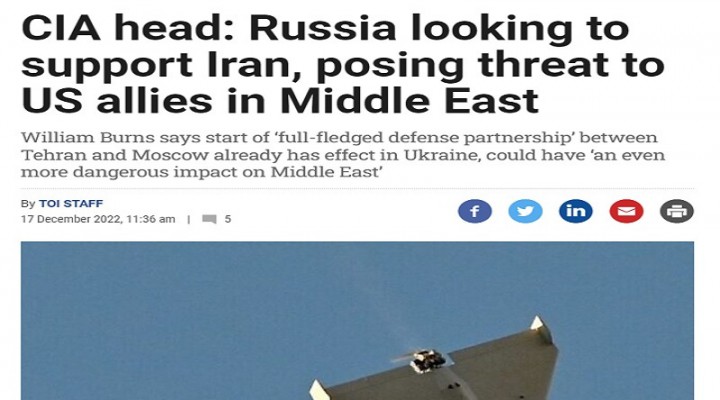The Military Dimension Of The Russian-Iranian Strategic Partnership Stabilizes West Asia

To be absolutely clear, Russia has no intent of encouraging Iran to carry out its own first strike against the US-Israel-GCC since any eruption of conventional conflict between those two sides would destabilize West Asia and thus throw that Eurasian Great Power’s southern periphery into chaos. Rather, Russia seems to have concluded that Iran is truly on the defensive in the region and that failing to support its deterrence capabilities could lead to the worst-case scenario of its foes seriously contemplating a first strike against it.
CIA chief William Burns warned last week that the military dimension of the Russian–Iranian Strategic Partnership risks destabilizing West Asia. According to him, “The Russians are beginning to look at ways in which, technologically or technically, they can support the Iranians, which poses real threats to Iran’s own neighborhood, to many of our friends and partners in Iran’s neighborhood as well.” The opposite is actually true though in that their growing ties will end up reinforcing stability in this geostrategic region.
The only reason why the US, Israel, and/or the GCC haven’t yet conventionally attacked Iran despite heated tensions over the past decade is because the Islamic Republic has been able to successfully deter them through its rapid military advances, especially concerning its reported ballistic missile capabilities. Its Resistance Economy has successfully indigenized production of related state-of-the-art systems, yet there’s also no denying that this continues to be a struggle and that its rivals have a competitive edge.
After all, the US-Israel-GCC closely cooperate with one another to varying extents and each have their own impressive military-industrial complexes that aren’t impeded by sanctions. As the “Fourth Industrial Revolution”/”Great Reset” (4IR/GR) continues unfolding and its attendant technologies gradually become incorporated into that aforementioned complex, the military-technical gap between Iran and its rivals could widen and ultimately result in them contemplating a strike against the Islamic Republic.
It’ll be difficult for heavily sanctioned Iran to keep up with them in this aspect of their ongoing arms race, and if it falls too far behind, then the balance of power might shift to the point of trending in its foes’ favor. That would be disastrous for regional stability if it leads to them becoming confident that they could thwart the Islamic Republic’s second-strike capabilities and thus inspiring them to consider a crippling first strike sometime in the coming future like they’ve wanted to do for a decade already.
It’s for this reason why it’s so important for Iran to have reliable access to relevant technologies from one of their peer competitors, ergo the need for redoubling the military dimension of the Russian-Iranian Strategic Partnership. While much about their security ties remains speculative, it’s not far-fetched to predict that Moscow intends to reward Tehran for serving as one of its alternative valves from Western pressure over the past year by bolstering its strategic partner’s military capabilities.
To be absolutely clear, Russia has no intent of encouraging Iran to carry out its own first strike against the US-Israel-GCC since any eruption of conventional conflict between those two sides would destabilize West Asia and thus throw that Eurasian Great Power’s southern periphery into chaos. Rather, Russia seems to have concluded that Iran is truly on the defensive in the region and that failing to support its deterrence capabilities could lead to the worst-case scenario that was just explained.
CIA chief Burns is tasked with manipulating global perceptions in support of the US-led West’s Golden Billion and this de facto New Cold War bloc’s unipolar hegemonic interests, however, which is why he sought to mislead the masses about the regional impact of closer Russian-Iranian military cooperation. Even though Israel and the GCC are balancing between the Golden Billion and the jointly BRICS– & SCO-led Global South, their conventional security interests are still supported by the first-mentioned.
With that in mind, it can’t ever be discounted that the US could orchestrate a series of events designed to push the Gulf to the brink of war, especially once that declining unipolar hegemon and its regional allies feel confident enough with their 4IR/GR-bolstered military capabilities vis a vis Iran. The only credible chance of averting that scenario is for Russia to help Iran keep pace with its rivals’ military-technical advances, hence the mutually beneficial reason behind strengthening their related ties.
Considering these military dynamics and their potential geopolitical consequences, there’s every reason to expect the security dimension of the Russian-Iranian Strategic Partnership to comprehensively expand in the coming future. Unlike what Burns falsely claimed, this wouldn’t be driven by the desire to destabilize West Asia but to reinforce stability in that pivotal region by bolstering Iran’s deterrence capabilities, which would in turn keep multipolar processes there on track.
https://korybko.substack.com/p/the-military-dimension-of-the-russian
 TheAltWorld
TheAltWorld 
0 thoughts on “The Military Dimension Of The Russian-Iranian Strategic Partnership Stabilizes West Asia”